Alison Croggon reviews Little Ones Theatre’s The Nightingale and the Rose
Oscar Wilde is one of those writers whose poetic gifts seldom shone to advantage in his poetry. They glow deeply in his plays and prose: I suspect because the plainer rhythms prevent his diction, always trembling along the verge of arch, from tipping over into jingly kitsch. Add the intricate prosody Wilde favoured in his poems and you’re in danger of suffocating to death. (The exception, of course, is The Ballad of Reading Gaol, with its notably starker diction.)
Even in his prose Wilde’s is a dangerous poetry, seductively theatrical in its rhythms, unafraid of risking the edge of self-parody. His short story collections, The Happy Prince and Other Stories and The House of Pomegranates, demonstrate his poise: he reins in an extravagance of metaphor and feeling with a dark wit and a dose of bitter realism. The Nightingale and the Rose, a short, elegant fable about the price of art and love (for Wilde, these were often synonyms) is a case in point.
The Nightingale and the Rose at Theatre Works is the second in a projected trilogy of Wilde adaptations by Little Ones Theatre. (Sadly, I didn’t see their production of The Happy Prince.) Apparently they’re queering up Oscar, although it’s difficult to imagine, as one of the major avatars of camp, that he needs it. Wilde’s “art for art’s sake”, his valorisation of sensual texture, his cutting against emotional extravagance with razor wit, his connoisseurship of vulgarity, are all defining attributes of a certain influential kind of queer aesthetic.
In many ways, most notably in its performances, this adaptation of The Nightingale and the Rose gets it right. It’s a parable about a nightingale who overhears a student lamenting his lack of a red rose with which to woo his beloved and sacrifices everything to create it for him. It rehearses many of Wilde’s speculations about beauty, love and art in a world hostile to all of them, whether because of the proclaimed rationality of a materialistic age or religious morality. The conclusion is ambiguous: is the nightingale a fool for believing in Love, despite the fallibility of the lover, or is the beauty she creates, however despised, worth it for its own sake?
Eugyeene Teh’s set and costumes made me feel that I was watching some fin de siècle performance, possibly in 1890s Paris. The stage is dominated by a huge moon like so many art nouveau lamps, and strikes a naïve quality, an exposure of its own artifice, that feels exactly correct. The stylised performances from Jennifer Vuletic as the Nightingale, Yuchen Wang as a series of rose bushes and Brigid Gallacher as the Student – half dance, half poetic declamation – walk a tightrope. Vuletic as the operatic Nightingale holds her nerve in a deeply impressive performance, finding the poise required to deliver Wilde’s language.
Stephen Nicolazzo’s direction brings together a bricolage of references, which for me sometimes dissipate rather than intensify its effects. The show opens with some verses from Keats’ Ode to a Nightingale, touching deftly on Wilde’s championing of Keats (he always preferred Keats to Wordsworth among the English Romantics, and given the sensuality of Keats’ language, it’s easy to see why). Other choices are not so happy: the jarring introduction of Morrisey, for instance, feels like a failure of nerve rather than boldness.
It’s a pleasant 45 minutes in the theatre, but left me wanting more: despite the performances I felt a bit removed, and the passion never quite hit home. I was looking for a further edge of extremity, perhaps, that for me lurks beneath the intricate surfaces of those stories, hiding in their very DNA.
The Nightingale and the Rose by Oscar Wilde, directed by Stephen Nicolazzo. Set and costumes by Eugyeene Teh, lighting design by Katie Sfetkidis, sound design and composition by Daniel Nixon. Performed by Jennifer Vuletic, Brigid Gallacher and Yuchen Wang. Little Ones Theatre at Theatre Works until June 10. Bookings
Theatre Works allows for wheelchair access and mobility aids. Please discuss requirements with box office staff when you book.

